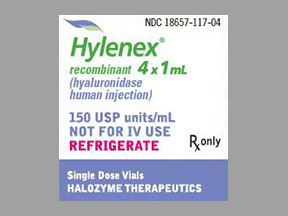
Hylenex Coupons & Savings Card – Discount Prices from $38.93
My prescription
Edit
1ML of 150UNIT/ML, Hylenex (1 Vial)
Select pharmacy

CVS
$74.84
COUPON PRICE
Walmart
$38.93
COUPON PRICE
Walgreens
$49.92
COUPON PRICE
Albertsons
$58.26
COUPON PRICEHylenex savings card
Show this card to your pharmacist
Walmart
$38.93
BIN
ID
PCN
GRP
019876
LHC03D8059
CHIPPO
LHX
Powered by
Price history for Hylenex
1 Vial, 1ML of 150UNIT/ML
Average retail price for Hylenex
Average SaveHealth price for Hylenex
Our price history data is based on aggregated prescription data collected from participating pharmacies in America. Our prescription data updates daily to reflect the latest price changes. If you notice a missing data point, it means there wasn't sufficient data available to generate a monetary value for that date.
*Retail prices are based on pharmacy claims data, and may not be accurate when we don't have enough claims.
Hylenex dosage forms
Dosage Quantity Price from Per unit 1ML of 150UNIT/ML 1 Vial $38.93 $38.93 1ML of 150UNIT/ML 2 Vials $96.85 $48.42 1ML of 150UNIT/ML 3 Vials $154.77 $51.59
| Dosage | Quantity | Price from | Per unit |
|---|---|---|---|
| 1ML of 150UNIT/ML | 1 Vial | $38.93 | $38.93 |
| 1ML of 150UNIT/ML | 2 Vials | $96.85 | $48.42 |
| 1ML of 150UNIT/ML | 3 Vials | $154.77 | $51.59 |
What is Hylenex injection used for?
Hylenex injection is used to facilitate the dispersion and absorption of other injected drugs. It is also used to increase the absorption of subcutaneous fluids and to improve the resorption of radiopaque agents in subcutaneous urography.
How much does a vial of Hylenex cost?
The cost of a vial of Hylenex can vary depending on factors such as the pharmacy, location, and insurance coverage. On average, the price can range from $200 to $300 per vial. It is advisable to check with local pharmacies or insurance providers for the most accurate and up-to-date pricing.
Where do you inject Hylenex?
Hylenex is typically injected subcutaneously, which means it is administered just under the skin. Common sites for subcutaneous injections include the abdomen, thigh, or upper arm. It is important for a healthcare professional to determine the appropriate site and administer the injection.
How much does Hylenex cost?
The cost of Hylenex can vary depending on factors such as the pharmacy, location, and whether the patient has insurance coverage. It is recommended to contact local pharmacies for the most accurate and up-to-date pricing information. Additionally, patients should check with their insurance provider to determine if Hylenex is covered under their plan and what the out-of-pocket cost might be.
